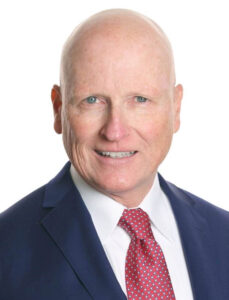TRURO — A self-proclaimed “professional troublemaker” may not be the person you’d expect to be leading a workshop on civility in politics. But that’s what former Republican state Rep. Daniel Winslow will do at the Truro Public Library on Sept. 21.

Winslow, who was chief legal counsel in the administration of former Mass. Gov. Mitt Romney, is currently president of the New England Legal Foundation, a nonprofit that has been “standing for Free Enterprise, Individual Property Rights, and Against Government Overreach since 1977,” according to its website.
Winslow, 65, represented the Ninth Norfolk district on Beacon Hill for two years and before that served as a district court judge in Wrentham.
Since he moved to Truro in 2019, he’s been concerned, he says, by people’s behavior during meetings in town. “I’ve been surprised at how personal the conversations were,” he says. “Personal attacks are something that you can’t do, because that’s not civil conduct.”
The Truro Select Board came close to instituting a civility pledge earlier this year following complaints about some people’s behavior at public meetings.
But board members raised questions about whether a such a pledge would stimulate or hinder constructive discourse. In the end, they decided not to institute the pledge, which would have been recited before board and committee meetings. Last August, then-vice chair of the select board Bob Weinstein said the directive could interfere with “open, unfettered discussion.”
The board’s choice not to proceed with the pledge closely followed a state Supreme Judicial Court ruling. In March 2023, the court struck down a Southborough bylaw that had mandated civil conduct at meetings on the grounds that it abridged the right to free speech.
Although some civility advocates were dismayed by the ruling, Winslow agreed with it. As important as he believes civility is, given that “there’s so much rancor in public life that we’ve sort of lost touch with the construct of civil society,” he says, he wouldn’t support a civility pledge. “We can’t mandate civility,” he says. “We can teach it.”
According to Truro Library Director Tricia Ford, the upcoming program was not precipitated by the rancorous debate in town. It materialized, instead, from a chance encounter.
According to Winslow, after his foundation debuted “Beantown Beanfest,” an outdoor Boston affair for all things bean, which, incidentally, drew the state’s only all-female mariachi band, he was left with 15 enormous beanbags. They were too big for his office, so he connected with Ford and offered them to the library. The two got to talking.
Ford says the program is consistent with the library’s mission “to engage our community in literature, in learning, and in the transformative power of information.” It meshes well with mediation workshops the library has held about de-escalation techniques, she says, and with the presidential debate watch parties the library hosted leading up to the 2020 election.
Ford was nervous to host those parties, she says, and advertised beforehand that “pizza and civility will be served.”
During his political career, Winslow says, he was “a little red voice in a very blue state.” It was civility, he says, that allowed him to get things done — like successfully proposing reform of the state’s understanding of intellectual disabilities — during the two years, from 2011 to 2013, that he served in the legislature. He tells of texting with Marty Walsh, the former Democratic mayor of Boston and his good friend, and he calls current Gov. Maura Healy “somebody I admire very much.”
Winslow is currently reading an advance copy of Alexandra Hudson’s The Soul of Civility: Timeless Principles to Heal Society and Ourselves and likes Hudson’s distinction between civility and politeness. Whereas politeness is external and rooted in behavior, he says, civility is about one’s stance toward others: “You respect them as a human, you respect where they’re coming from, even if you disagree,” he says.
In Truro, where a $30-million DPW construction project and affordable housing plans have townspeople divided, one could see Winslow’s program as a way to smooth things over, temper the sparks. But Winslow says that’s not his goal. “Polarization is great,” he says, because it creates fertile ground for debate, a pillar of civil society.
Reverence for civility is not universal. In Against Civility: The Hidden Racism in Our Obsession With Civility, political scientist Alex Zamalin argues that the persistence of the racial hierarchy in the U.S. has always been laced with civility language and directives.
“Civility is a central term through which racial inequality has been maintained,” Zamalin writes. He argues that civility has been touted by Americans across the political spectrum, from segregationists to free marketeers to staunch progressives. “All of them traffic in ideas about public etiquette to declare what counts as good citizenship and what doesn’t,” he says.
To Winslow, civility is a political strategy. Among those he salutes from across the aisle is former Mass. Governor and presidential candidate Michael Dukakis. Winslow credits Dukakis with a quotation that a Google search suggests is the product of a multi-century game of telephone: supposedly, Abe Lincoln said it first. In Winslow’s version, “Democrats are like cats. You wake up in the middle of the night, you hear them screaming at each other, and you think they’re fighting. But, in fact, you wake up in the morning, and they were just making more cats.”
Winslow will, according to the library’s website, “explore the importance of civil disagreement and offer tips on how to disagree without being disagreeable” at the Truro Public Library on Thursday, Sept. 21 at 6:30 p.m.



